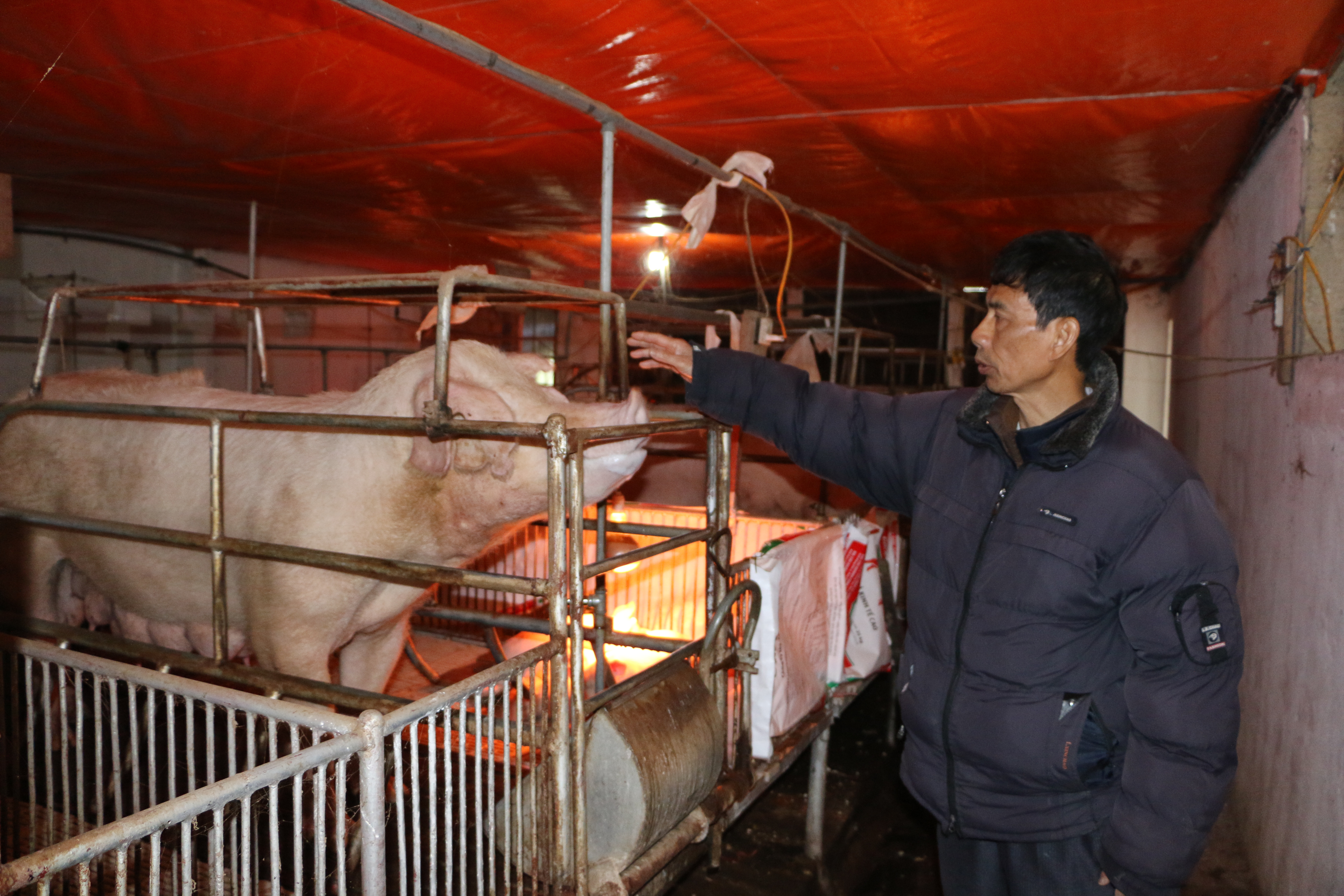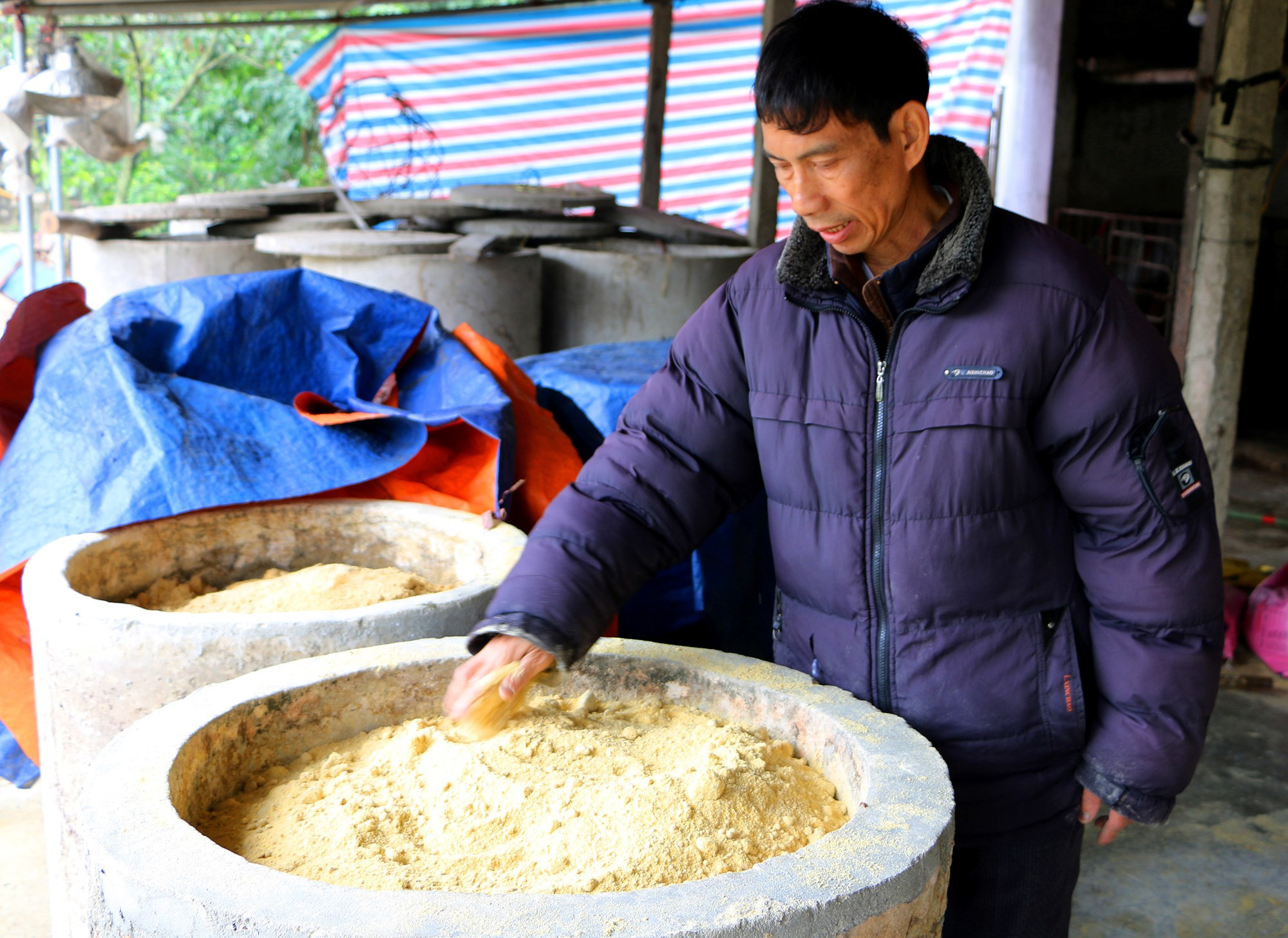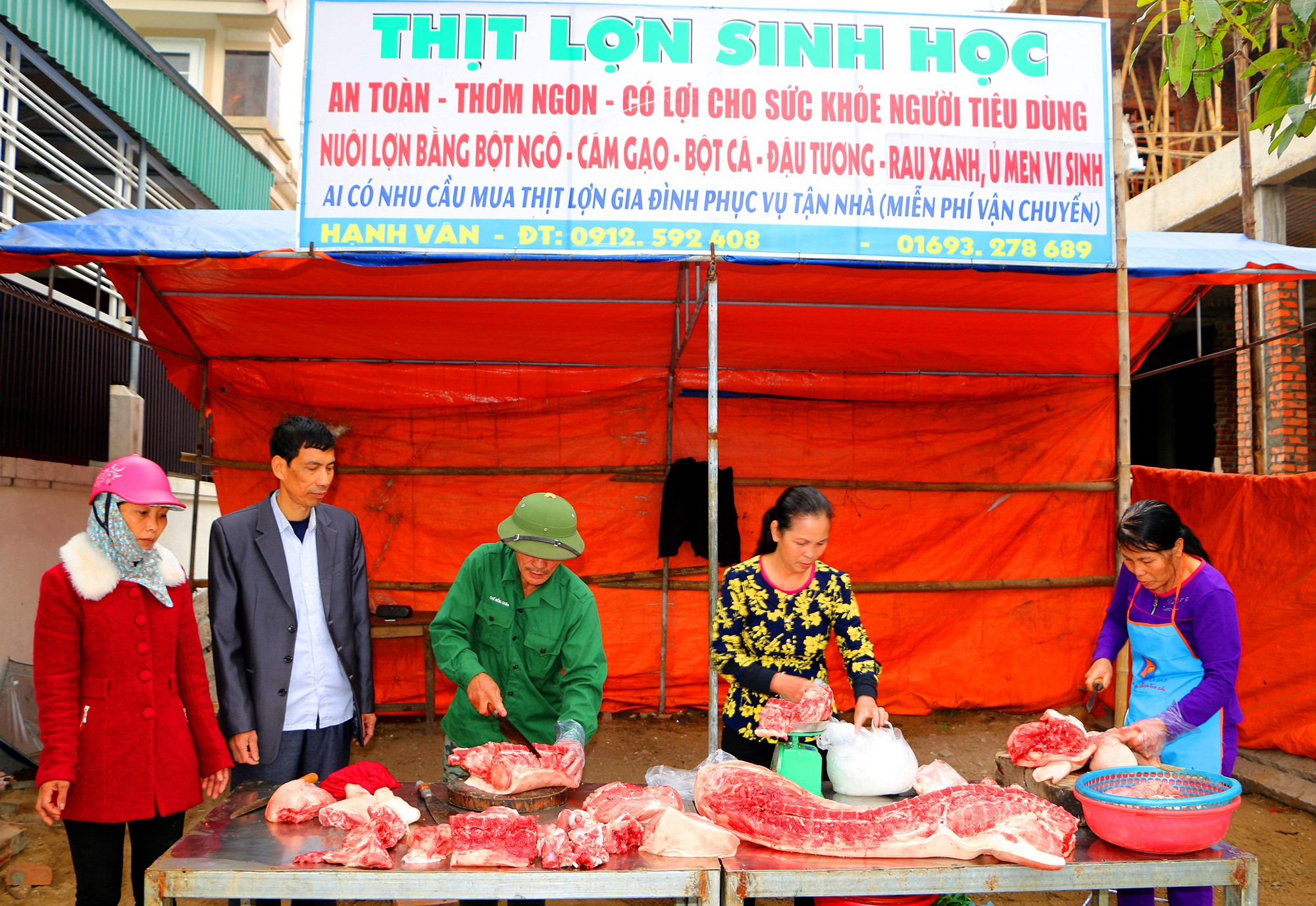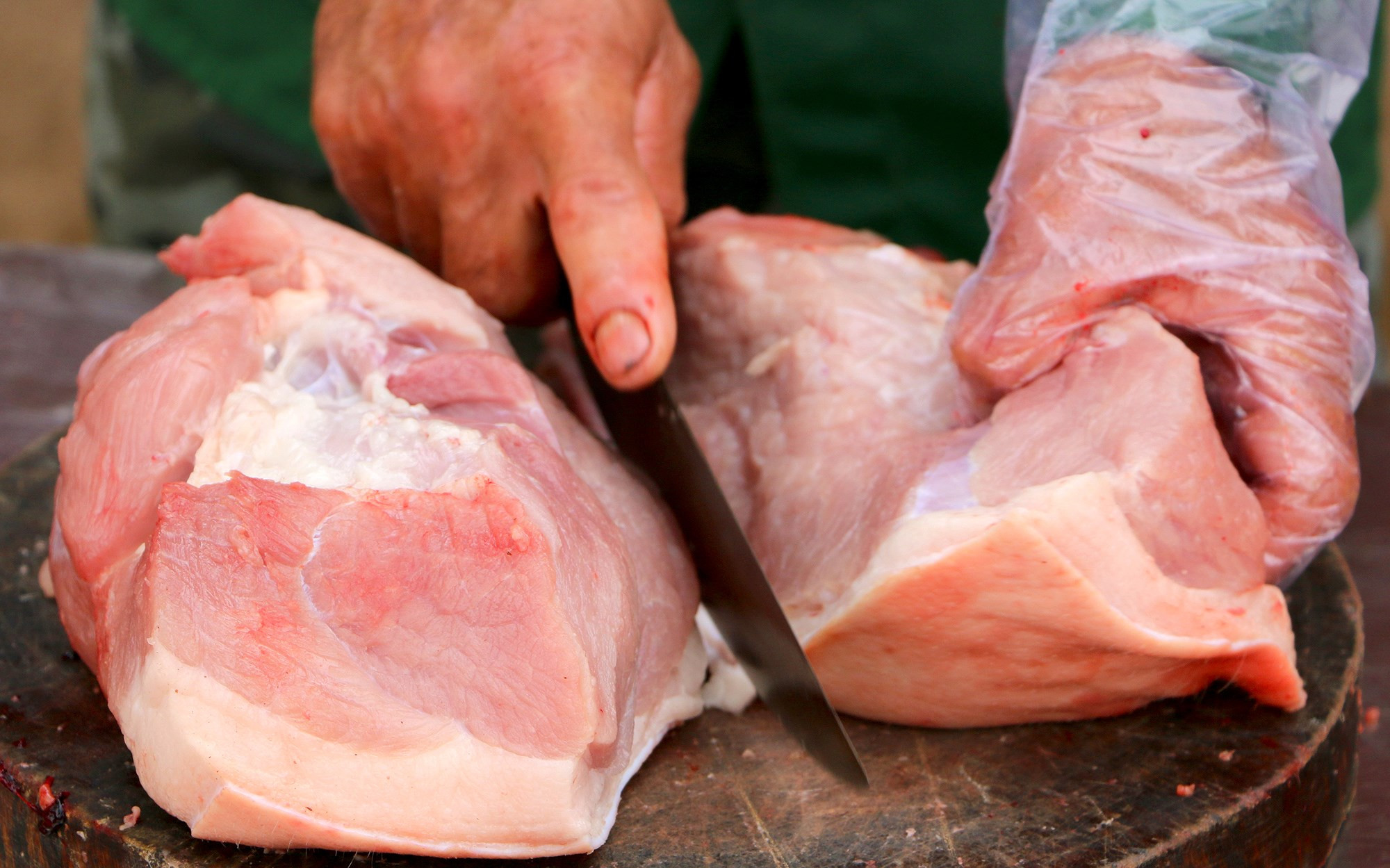Pioneer in building a clean lean pork chain in Cua Lo town
(Baonghean) - In Cua Lo Town, many people know Mr. Phung Duc Hanh as the owner of a livestock farm in Cat Lieu block, Nghi Thu ward and is the first facility to produce and supply clean lean pork to the market.
In Cua Lo Town, many people know Mr. Phung Duc Hanh as the owner of a livestock farm in Cat Lieu block, Nghi Thu ward and is the first facility to produce and supply clean lean pork to the market.
Once one of the province's largest livestock farms, he was repeatedly commended by the Provincial People's Committee for his achievements in veterinary livestock farming, but recently, to ensure environmental requirements, he has reduced the scale and moved part of the farm to Nghi Thinh commune, so currently his facility in Cat Lieu block is just a small-scale, comprehensive farm model, hidden at the end of the village.
 |
| Mr. Phung Duc Hanh takes care of sows at his farm. Photo: Phuong Ha |
As a discharged soldier, in 1990, Mr. Hanh opened a livestock farm. In 2000, with the encouragement of the province, Mr. Hanh started a farm. He visited many domestic livestock farms to learn how to do it. For nearly 30 years, he raised from breeding pigs to dairy cows and now does ornamental gardening, raising breeding pigs and clean organic lean pigs.
He has experienced both success and failure, but the precious thing is that he is still passionate about livestock farming and considers it a career that is closely linked to his life. He always cherishes the dream of not only building a production chain but also gradually providing clean and safe pork to consumers.
 |
| Mr. Hanh composts corn bran, soybeans and beneficial micronutrients with probiotics to feed his pigs. Photo: Phuong Ha |
In 2017, facing the difficult situation of livestock farming, the price of live pigs and breeding pigs, the two main products of the farm, dropped sharply, causing farmers like Mr. Hanh to be in dire straits. He commented that the livestock farming industry was at an extremely disadvantageous time, consumers turned their backs because livestock products, whether clean or unclean, had the same price; along with that, the authorities continuously discovered livestock farms using illegal growth stimulants; supplying and processing dirty food.
On the other hand, he also noticed that the price of pork was unusual when the price of live pigs dropped to a record low but the price of meat did not decrease, so he boldly switched, along with persistently pursuing raising clean pigs for slaughter and sale to the market.
 |
| Mr. Phung Duc Hanh's family's clean pork product display and sales counter named Hanh Van is right in front of the side gate of Cua Lo market. Photo: Phuong Ha |
To provide clean pork, ensuring food hygiene and safety, Mr. Hanh continued to research and learn; at the same time, he participated in training courses on food hygiene and safety organized by the province and town. During the process of raising and producing livestock, Mr. Hanh realized that although the industrial method was effective, in the long run it was difficult to find output and sustainability, so instead of raising livestock with industrial feed, he decided to raise livestock with traditional feed.
Along with investing in facilities and inviting veterinary engineers to directly monitor and care for the piglets from a young age, Mr. Hanh continued to invest in renovating the slaughterhouse. With 8 sows, each litter produces an average of 200 piglets, he not only has piglets to sell but also to raise his own source of clean pork.
He only uses corn flour, soybeans and other nutrients to grind, mix and then incubate with probiotics to ferment and then feed the pigs, absolutely not using banned substances. Besides, to keep the pigs healthy and disease-free, he makes the barn clean and airy, vaccinates and supplements nutrients, the pigs' daily drinking water is carefully filtered clean water... With this method, Mr. Hanh saves about 20% of the cost compared to using industrial feed.
With the above motto, although the time to sell his raised pigs is longer (6-7 months instead of just 3 months), the output of the products is stable. Mr. Hanh added: raising pigs by feeding them with biological products saves on feed costs, making up for the longer raising time. The profit is not high because the direct slaughter and sale is used to offset some of the costs, helping the farm overcome difficulties due to the drop in pig prices.
 |
| Clean, biologically safe pork products provided by Hanh Van facility ensure quality and food safety. Photo: Phuong Ha |
Currently, Mr. Hanh and his family are persistent in the motto of “clean from production to table”. To do that, he sets high requirements for his workers and closely monitors the safe and clean farming process; when switching to supply, he invests in slaughtering and selling according to the correct process for food hygiene and safety.
In the near future, to ensure hygiene and food safety and to increase the slaughter capacity to 3 pigs/day, he will invest and renovate the slaughter area according to the prescribed standards to invite veterinary agencies to inspect and evaluate. Currently, with a scale of over 2 hectares, his farm regularly has a herd of about 100 super lean pigs, ensuring that 2-3 pigs are slaughtered each day, so he can completely control the origin of the products. In the near future, after completing the slaughter facility, he hopes to have the Town Veterinary Agency inspect and issue a certificate so that he can confidently raise and produce livestock.
One of the difficulties of clean and safe food production and supply facilities today is the price because clean food with clear origin often has a high price. Specifically, the price of pork sold by Mr. Hanh's facility is always 10-15% higher than the price of other pork, so it is difficult for large meat consumers such as supermarkets, restaurants, hotels, schools, and factories because consumers have to consider.
Therefore, in the coming time, along with propaganda to encourage farmers to actively apply technology and biological products to livestock farming, limit industrial feed, it is necessary to strengthen inspection and supervision of food quality. For his part, Mr. Hanh hopes that the authorities will create conditions for inspection and assessment so that production facilities and farms like his can participate in the "chain" to supply clean and safe products to consumers. At that time, not only will businesses and production facilities benefit and stimulate production development, but the health and safety of consumers and the interests of the community will be respected and promoted.

